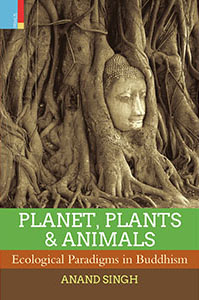
Planet, Plants and Animals : Ecological Paradigms in Buddhism
EDITOR – Anand Singh
| HB ₹995 . $54.95 . ₤42.95 |
||
INFORMATION
- EDITOR : Anand Singh
- HB ISBN : 978-93-5290-226-2
- Year : 2019
- Extent : 296 pp.
- Discount available on checkout
- Usually dispatched within 3 to 5 working days.
This book is a modest attempt to look at and examine the beginnings of ecological concerns in the Buddhist religious traditions, based on a meticulous examination of diverse narratives pointing towards a correlation between Buddhism and environmental issues. By examining the seminal teachings of the Buddha through the concepts of Paticcasamuppada, Kamma (Karmat), the eightfold path, ahimsa, Pancasila and in literature, like the Jatakas, Therigatha and Theragatha in relation to animals, population dynamics, yajnas and animal sacrifices as well as flora and fauna associated with the Buddha, this book attempts to discover the inescapable connection between the individual’s well-being and Nature.
The Editor
Anand Singh is Professor in the School of Buddhist Studies, Philosophy and Comparative Religions, Nalanda University. He has authored Buddhism at Sarnath (2014), Tourism in Ancient India (2005) and Pracheen Bhartiya Dharma (2010) and edited Dana: Reciprocity and Patronage in Buddhism (2017) which has received the ‘Outstanding Academic Book on Buddhism’ award by the Dhammachai International Research Institute, New Zealand. Recipient of the Dr. I.G. Khan Memorial Prize, by the Indian History Congress in 2008 and 2010, Anand has published 25 research papers and articles in international and national journals.
As a global figure, Tagore transcends the boundaries of language and reaches out to people distant both in time and space. His art took inspiration from contemporary Western trends and became a powerful means to connect with people beyond Bengal. Word, image, song, and text were his tools of communication, as also his extraordinary presence in a sartorial garb of his own design. A littérateur in many genres, the impact of his work was determined both by the material he presented, and by its simultaneously local and global contexts. Now, when his international reputation has spanned over more than a hundred years, it is important to revisit the sites of Tagore’s eminence, and ask to what extent he was a ‘living text’ in the century that witnessed him as a global intellectual.
Accordingly, this volume investigates how Tagore’s writings and art are linked to the metalinguistic domains of the psychological, medical and mythical; how he was received in various cultures outside India; how his art was determined by individual circumstances and global aspirations; and how he acted as an inspiration to his contemporaries and subsequent generations including modern Indian writers and artists.
The Editor
Imre Bangha studied in Budapest and Santiniketan and at present is Associate Professor of Hindi at the University of Oxford. He has published books and essays in English, Hindi, and Hungarian on literature in Brajbhasha and other forms of old Hindi and has also prepared Hungarian translations from various South Asian languages. His work on the international reception of Bengali culture includes Rabindranath Tagore: Hundred Years of Global Reception (2014, co-edited with M. Kämpchen) and Hungry Tiger: Encounter between India and Central Europe (2007).




